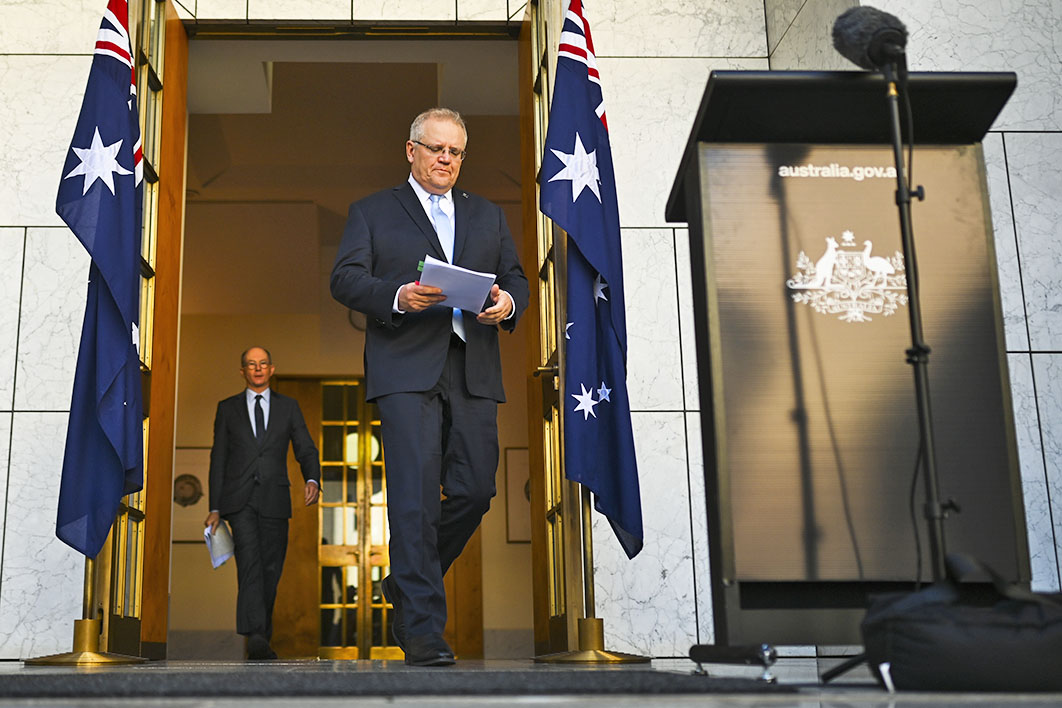“Unbearable,” “crippling” and “exorbitant” were the words used to describe Australia’s “debt and deficit crisis” back when net debt was 12.5 per cent of GDP. How quickly times have changed. The same people, now in government, last week described Australia’s forecast net debt of 35.7 per cent of GDP, three times bigger, as “manageable.” This change of mind took place in a week when federal and state governments were scratching their heads wondering why the public weren’t listening to government advice about Covid-19. Why indeed.
Trust in government is vital. Without trust, markets fail. Reform is near impossible. Economic growth is weaker, investment stalls, consumption flatlines, the tax system fails. Critical institutions ranging from the police and the courts to the Reserve Bank and the tax office can’t do their job. It took a pandemic to reveal just how big the cost of mistrust in government can be. When the public don’t listen to the health advice coming from their governments, the virus spreads, people die.
But why should they listen? Many of those in government who have pleaded with the public to heed scientific advice on Covid-19 have been the same people who told us that scientists are corrupt and untrustworthy on climate change. The people who warned us about the inherent incompetence of government and the inherent dangers of big government are now telling us that the biggest government in Australian postwar history is a good thing.
The consequences of these past short-sighted political wins have come home to roost. The result of historically low trust in government and institutions is on display for all to see.
The Edelman global trust survey asked Australians to rank government, business, the media and non-government organisations by how competent and ethical they were. None were found to be both. According to those surveyed, businesses are competent but unethical. NGOs are ethical but not competent. And the government and the media? Neither competent nor ethical. Forty-five per cent of Australians distrust these institutions. Only 12 per cent of Australians believe the government is run for “all the people,” according to Essential Research.
Nor is distrust limited to government and media. Revelations from royal commissions have shaken trust in the financial system, trade unions and the institutions charged with protecting our children. The Black Lives Matter movement has shone a spotlight on the deep systemic failings of our police and legal system. The scourge of tax avoidance among multinationals, the rich and big companies has undermined trust in our tax system, while rising wage theft and depressed wages feed the narrative of a system rigged against workers.
Political scandals involving Bridget McKenzie, Sam Dastyari, Pauline Hanson, Stuart Robert, Eddie Obeid, Ian Macdonald — too many to mention from all sides of politics — have shaken confidence in our political system. The private sector does little better. In the context of Covid-19, a third or more of Australians believe that cruise liners, big banks and insurance companies will “always act in their own interests, even if it endangers people or is detrimental to the public.”
Luckily, the news is not all bad. There is some evidence that Covid-19 has marginally increased the public’s trust in government and the media. In April, an Essential Research survey found that the number of people who believed the government was giving honest and objective advice rose from 56 per cent in March to 62 per cent in April. Trust in the media to provide honest and objective information about Covid-19 jumped from 35 per cent to 51 per cent over the same period.
Whether these positive developments can be sustained remains to be seen. But building trust in government and institutions should be seen for what it is: central to economic growth. Building trust will be a prerequisite for the government’s reform agenda. Any reforms will struggle without it.
The OECD shows us where to start. A lack of trust is strongly correlated with a perception of government corruption, a lack of confidence in the judicial system and a lack of confidence in the country’s leadership.
There is plenty of low-hanging fruit. Establishing a national anti-corruption authority and reforming political donations are no-brainers. Criminalising wage theft across Australia would boost confidence in our labour markets. Closing generous tax loopholes exploited by the rich would boost confidence in our tax system. Harsher criminal penalties for financial wrongdoers would boost confidence in our financial system. Disqualifying company directors who engage in anti-competitive conduct or who persistently mislead consumers — with financial penalties that are more than a mere cost of doing business — would boost confidence in our product markets. And stop cutting the ABC’s budget: the public have more trust in that institution than in our legal system, police, businesses, charities and every parliament and political party in the country.
We need to pick the low-hanging fruit because the other sources of distrust — rising inequality and diversified flows of information, social networks and technology — are much harder to solve in the short term. The statistics show the scale of the challenge. Thirteen per cent of Australians believe Bill Gates played a role in the creation of Covid-19. Thirteen per cent believe that Covid-19 is not dangerous and is being used to force people to get vaccines. Twelve per cent believe that the 5G wireless network is being used to spread the virus. Twenty per cent of Australians believe that the media and government are artificially increasing the number of people reported to have died from Covid-19 in order to scare the public. Google searches for “is the world flat” have tripled in the last three years.
The Australian economy is in desperate need of reform, but the government cannot implement reform without trust. Covid-19 has produced a rare uptick in public trust. Whether the government develops it or dashes it remains to be seen. •




